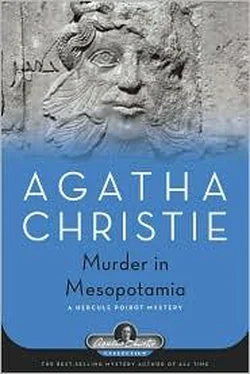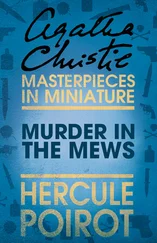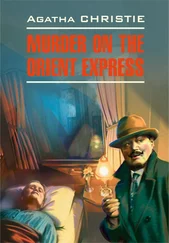Agatha Christie - Murder in Mesopotamia
Здесь есть возможность читать онлайн «Agatha Christie - Murder in Mesopotamia» весь текст электронной книги совершенно бесплатно (целиком полную версию без сокращений). В некоторых случаях можно слушать аудио, скачать через торрент в формате fb2 и присутствует краткое содержание. Год выпуска: 2007, ISBN: 2007, Издательство: Black Dog & Leventhal Publishers, Inc., Жанр: Классический детектив, на английском языке. Описание произведения, (предисловие) а так же отзывы посетителей доступны на портале библиотеки ЛибКат.
- Название:Murder in Mesopotamia
- Автор:
- Издательство:Black Dog & Leventhal Publishers, Inc.
- Жанр:
- Год:2007
- ISBN:ISBN-13: 9781579126919
- Рейтинг книги:3 / 5. Голосов: 1
-
Избранное:Добавить в избранное
- Отзывы:
-
Ваша оценка:
- 60
- 1
- 2
- 3
- 4
- 5
Murder in Mesopotamia: краткое содержание, описание и аннотация
Предлагаем к чтению аннотацию, описание, краткое содержание или предисловие (зависит от того, что написал сам автор книги «Murder in Mesopotamia»). Если вы не нашли необходимую информацию о книге — напишите в комментариях, мы постараемся отыскать её.
Murder in Mesopotamia — читать онлайн бесплатно полную книгу (весь текст) целиком
Ниже представлен текст книги, разбитый по страницам. Система сохранения места последней прочитанной страницы, позволяет с удобством читать онлайн бесплатно книгу «Murder in Mesopotamia», без необходимости каждый раз заново искать на чём Вы остановились. Поставьте закладку, и сможете в любой момент перейти на страницу, на которой закончили чтение.
Интервал:
Закладка:
‘There remains one other candidate for the title of murderer – Father Lavigny. My attention was attracted to the good Father straightaway by a certain discrepancy between his description of the strange man who had been seen peering in at the window and the one given by Nurse Leatheran. In all accounts given by different witnesses there is usually some discrepancy, but this was absolutely glaring. Moreover, Father Lavigny insisted on a certain characteristic – a squint – which ought to make identification much easier.
‘But very soon it became apparent that while Nurse Leatheran’s description was substantially accurate, Father Lavigny’s was nothing of the kind. It looked almost as though Father Lavigny was deliberately misleading us – as though he did not want the man caught.
‘But in that case he must know something about this curious person. He had been seen talking to the man but we had only his word for what they had been talking about.
‘What had the Iraqi been doing when Nurse Leatheran and Mrs Leidner saw him? Trying to peer through the window – Mrs Leidner’s window, so they thought, but I realized when I went and stood where they had been, that it might equally have been the antika-room window.
‘The night after that an alarm was given. Someone was in the antika-room. Nothing proved to have been taken, however. The interesting point to me is that when Dr Leidner got there he found Father Lavigny there before him. Father Lavigny tells his story of seeing a light. But again we have only his word for it.
‘I begin to get curious about Father Lavigny. The other day when I make the suggestion that Father Lavigny may be Frederick Bosner, Dr Leidner pooh-poohs the suggestion. He says Father Lavigny is a well-known man. I advance the supposition that Frederick Bosner, who has had nearly twenty years to make a career for himself, under a new name, may very possiblybe a well-known man by this time! All the same, I do not think that he has spent the intervening time in a religious community. A very much simpler solution presents itself.
‘Did anyone at the expedition know Father Lavigny by sight before he came? Apparently not. Why then should not it be someone impersonating the good Father? I found out that a telegram had been sent to Carthage on the sudden illness of Dr Byrd, who was to have accompanied the expedition. To intercept a telegram, what could be easier? As to the work, there was no other epigraphist attached to the expedition. With a smattering of knowledge a clever man might bluff his way through. There had been very few tablets and inscriptions so far, and already I gathered that Father Lavigny’s pronouncements had been felt to be somewhat unusual.
‘It looked very much as though Father Lavigny were an imposter.
‘But was he Frederick Bosner?
‘Somehow, affairs did not seem to be shaping themselves that way. The truth seemed likely to lie in quite a different direction.
‘I had a lengthy conversation with Father Lavigny. I am a practising Catholic and I know many priests and members of religious communities. Father Lavigny struck me as not ringing quite true to his role. But he struck me, on the other hand, as familiar in quite a different capacity. I had met men of his type quite frequently – but they were not members of a religious community. Far from it!
‘I began to send off telegrams.
‘And then, unwittingly, Nurse Leatheran gave me a valuable clue. We were examining the gold ornaments in the antika-room and she mentioned a trace of wax having been found adhering to a gold cup. Me, I say, “Wax?” and Father Lavigny, he said “Wax?” and his tone was enough! I knew in a flash exactly what he was doing here.’
Poirot paused and addressed himself directly to Dr Leidner.
‘I regret to tell you, monsieur, that the gold cup in the antika-room, the gold dagger, the hair ornaments and several other thingsare not the genuine articles found by you. They are very clever electrotypes. Father Lavigny, I have just learned by this last answer to my telegrams, is none other than Raoul Menier, one of the cleverest thieves known to the French police. He specializes in thefts from museums of objets d’art and such like. Associated with him is Ali Yusuf, a semi-Turk, who is a first-class working jeweller. Our first knowledge of Menier was when certain objects in the Louvre were found not to be genuine – in every case it was discovered that a distinguished archaeologist not known previously by sight to the director had recently had the handling of the spurious articles when paying a visit to the Louvre. On inquiry all these distinguished gentlemen denied having paid a visit to the Louvre at the times stated!
‘I have learned that Menier was in Tunis preparing the way for a theft from the Holy Fathers when your telegram arrived. Father Lavigny, who was in ill-health, was forced to refuse, but Menier managed to get hold of the telegram and substitute one of acceptance. He was quite safe in doing so. Even if the monks should read in some paper (in itself an unlikely thing) that Father Lavigny was in Iraq they would only think that the newspapers had got hold of a half-truth as so often happens.
‘Menier and his accomplice arrived. The latter is seen when he is reconnoitring the antika-room from outside. The plan is for Father Lavigny to take wax impressions. Ali then makes clever duplicates. There are always certain collectors who are willing to pay a good price for genuine antiques and will ask no embarrassing questions. Father Lavigny will effect the substitution of the fake for the genuine article – preferably at night.
‘And that is doubtless what he was doing when Mrs Leidner heard him and gave the alarm. What can he do? He hurriedly makes up a story of having seen a light in the antika-room.
‘That “went down”, as you say, very well. But Mrs Leidner was no fool. She may have remembered the trace of wax she had noticed and then put two and two together. And if she did, what will she do then? Would it not be dans son caractere to do nothing at once, but enjoy herself by letting hints slip to the discomfiture of Father Lavigny? She will let him see that she suspects – but not that she knows. It is, perhaps, a dangerous game, but she enjoys a dangerous game.
‘And perhaps she plays that game too long. Father Lavigny sees the truth, and strikes before she realizes what he means to do.
‘Father Lavigny is Raoul Menier – a thief. Is he also – a murderer?’
Poirot paced the room. He took out a handkerchief, wiped his forehead and went on: ‘That was my position this morning. There were eight distinct possibilities and I did not know which of these possibilities was the right one. I still did not know who was the murderer.
‘But murder is a habit. The man or woman who kills once will kill again.
‘And by the second murder, the murderer was delivered into my hands.
‘All along it was ever present in the back of my mind that some one of these people might have knowledge that they had kept back – knowledge incriminating the murderer.
‘If so, that person would be in danger.
‘My solicitude was mainly on account of Nurse Leatheran. She had an energetic personality and a brisk inquisitive mind. I was terrified of her finding out more than it was safe for her to know.
‘As you all know, a second murder did take place. But the victim was not Nurse Leatheran – it was Miss Johnson.
‘I like to think that I should have reached the correct solution anyway by pure reasoning, but it is certain that Miss Johnson’s murder helped me to it much quicker.
‘To begin with, one suspect was eliminated – Miss Johnson herself – for I did not for a moment entertain the theory of suicide.
‘Let us examine now the facts of this second murder.
Читать дальшеИнтервал:
Закладка:
Похожие книги на «Murder in Mesopotamia»
Представляем Вашему вниманию похожие книги на «Murder in Mesopotamia» списком для выбора. Мы отобрали схожую по названию и смыслу литературу в надежде предоставить читателям больше вариантов отыскать новые, интересные, ещё непрочитанные произведения.
Обсуждение, отзывы о книге «Murder in Mesopotamia» и просто собственные мнения читателей. Оставьте ваши комментарии, напишите, что Вы думаете о произведении, его смысле или главных героях. Укажите что конкретно понравилось, а что нет, и почему Вы так считаете.










